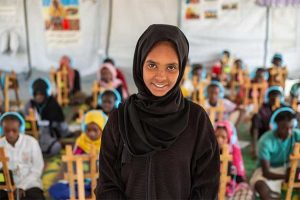Education Cannot Wait in Responding to the Regional Crisis Stemming From the Armed Conflict in Sudan
 16 April 2024
16 April 2024

By Yasmine Sherif
NEW YORK, Apr 15 2024 (IPS-Partners)
The conflict in Sudan is one of the worst in the world today, and millions of children and adolescents bear the brunt within and across the border from Sudan.
As we mark the one-year anniversary of this vicious conflict, we call on world leaders to ensure that all girls and boys impacted by the conflict can access life-saving quality education. Their hope and future hinge on this.
Sudan experiences a humanitarian crisis of epic proportions. Without urgent international action, this catastrophe could engulf the entire country and have even more devastating impacts on neighboring countries, as refugees flee across borders into neighboring states.
The brutal conflict continues to take innocent lives, with over 14,000 children, women and men reportedly killed already. According to the United Nations, half of Sudan’s population – 25 million people, including 14 million children – urgently need humanitarian assistance. An estimated 5 million people are one step away from famine.
Sudan also has the outside Sudan since 15 April 2023, including 4 million children.
Most schools are shuttered or are struggling to re-open across the country, leaving nearly 19 million school-aged children at risk of losing out on their education. To put this in perspective, that’s more children at risk than the total populations of Finland, Ireland and Norway combined.
As the global fund for education in emergencies and protracted crises hosted within the United Nations, Education Cannot Wait (ECW) and our global strategic partners have responded with speed, agility and coordination to provide girls and boys impacted by this complex conflict with the safety, hope and opportunity of a quality education.
ECW has provided US$10 million to date in response to the largest forced displacement crisis in the world today. Over 8 million people have been displaced inside and regional refugee education needs, with First Emergency Response grants announced in the Central African Republic, Chad, Egypt, Ethiopia and South Sudan. In Sudan, we have provided US$28 million in funding, including a US$5 million grant announced in August 2023 that will reach over 86,000 girls and boys with access to an inclusive, quality education.
Yet, these investments are simply not enough. We must step up global funding for education in all the world’s forgotten crises, in places like Sudan, Central African Republic, Chad, the Sahel, South Sudan and so many more. In all, over 224 million girls and boys are having their futures ripped from their hands by armed conflict, forced displacement, climate change and other protracted crises around the globe.
This not only threatens global security and efforts to deliver on the Sustainable Development Goals, but it is also an affront to their humanity. Without safe places to learn and grow, girls face a number of grave risks, including child marriage, sexual violence, human trafficking and forced labor. Boys find themselves against impossible odds and risk forced recruitment as child soldiers, forced labor and other assaults on their human rights. It’s an impossible un-ending cycle of violence, displacement, poverty, hunger, chaos and uncertainty.
With school feeding programmes, they have nutritious meals. With gender-inclusive classrooms, they have safe places to learn. With mental health and psychosocial support, they find a way to regain their dignity and build strong, resilient communities. It’s a systems-wide approach that puts children first in our investments in sustainable development and puts humanity first in our global efforts to end war and build a better future for generations to come.
As we build on calls from today’s International Humanitarian Conference for Sudan and its Neighbours, the African Year of Education, and other important efforts to deliver on the Sustainable Development Goals, we appeal to public donors, the private sector and philanthropic foundations to urgently mobilize US$600 million in renewed support for ECW’s 2023-2026 Strategic Plan. With a total of US$1.5 billion, we can reach 20 million children and adolescents.
In South Sudan, education is an opportunity to “change my life” for Living Sunday, a young teenage mother who resumed her education against all odds. In Ethiopia, where prolonged drought made worse by climate change has disrupted education for an entire generation, it means Nakurchel, 12, is attending school for the first time in her life. In her own words: “Education has given me wings to fly.” Still more needs to be done, in sub-Saharan Africa, only 1 out of 9 children can read a simple text.
Sudan cannot wait. Africa cannot wait. The rest of the world needs to be unapologetically impatient in heeding their calls.
Excerpt:
ECW Executive Director Yasmine Sherif Statement on the One-Year Anniversary of Hostilities in Sudan
